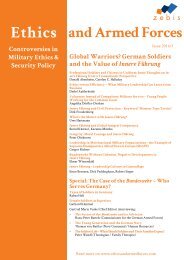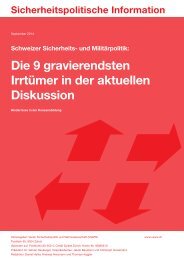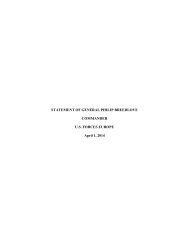FULLTEXT01
FULLTEXT01
FULLTEXT01
You also want an ePaper? Increase the reach of your titles
YUMPU automatically turns print PDFs into web optimized ePapers that Google loves.
TACTICAL THOUGHT<br />
2014 September 29 th<br />
Two smaller groups consisted of Colleagues’ influences (1 reply, regarding<br />
international colleagues) and operations (4 replies). Aspects of the officers’ Personal<br />
experiences and Exercise activities go together, when primarily within the tactical<br />
exercises from which experiences can be drawn.<br />
These two aspects were emphasized by twenty-one officers, about twice as many than<br />
for each of the aspects, Education / school activities and Literature / games and<br />
Combination of influences.<br />
Result summary; the question resulted in answers distributed relatively similarly into<br />
the following five groups:<br />
1. Education / school activities (9)<br />
2. Personal experiences (11)<br />
3. Literature / games (9/2)<br />
4. Personal influences (senior officers, colleagues) (7)<br />
5. Exercise activity (10)<br />
6. Combination of the influences (11).<br />
Aspects of the officers’ Personal experiences, Influences and Exercise activities connect<br />
when primarily within these areas from where more practical experiences can be drawn.<br />
These three aspects together were emphasized by twenty-eight officers, and dominate<br />
clearly above each of the aspects Education / school activities and Literature / games<br />
and Combination of influences. Clearly addressed educational influences are only stated<br />
by nine officers as dominant. This result reveals that the structure and content of<br />
exercises might be particularly important to analyse and implement, according to the<br />
current form of tactical thinking that is normatively addressed.<br />
Question 15. What do you think affects the development of tactics and tactical<br />
thinking<br />
The responses (34 of 43 possible) were divided into a large number of positions. Two<br />
areas; Experiences and influences from past wars / interventions received the most<br />
replies (8 each). Three areas; Schooling / training and External developments and Lack<br />
of influences due to the low priority in the armed forces received five (5) responses<br />
each. Exercises/training and Individual influences (strong commanders, people with<br />
strong will and drive in general), Technological development, and the Swedish Armed<br />
Forces organizational and material development then received four (4) replies each.<br />
Personal experience, History (WW2) and Money received two (2) responses each.<br />
Finally, one (1) reply each concerned the following aspects; Research / studies, Lack of<br />
opponents to practice against, Time inhibitory processes and staff work, Current<br />
workload on commanders, Social climate and Resource allocation, Past conflicts, War<br />
experience, Doctrines, USA, Types of threat (existential threats or threat types in<br />
international missions), Climate for discussion, Open-mind to new solutions, Swedish<br />
ranger tactics/mind-set.<br />
5





